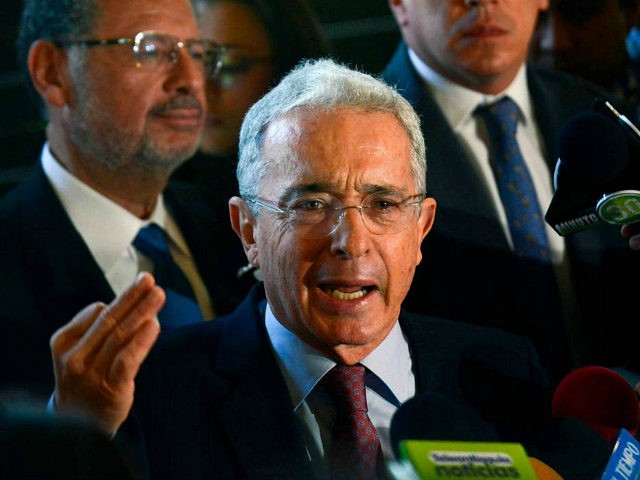VILLAVICENCIO, Colombia – Protests broke out across Colombia on Wednesday after the country’s Supreme Court ordered the house arrest of former conservative President Álvaro Uribe on charges of witness tampering.
The court is investigating if Uribe, who served as president between 2002 and 2010 and remains a senator in the Colombian Congress, paid former paramilitary fighter Juan Guillermo Monsalve to change his testimony over Uribe’s alleged role in setting up the armed group.
As the only entity in Colombia that can investigate former presidents, the court is currently examining 17 claims of criminal activity against Uribe filed by his political opponents. He has vehemently denied all the charges against him.
“The loss of my freedom causes me profound sadness for my wife, for my family, and for the Colombians who still think I did something good for the country,” Uribe wrote on Twitter.
Protests consequently broke out across Colombia, the largest being in Uribe’s home city of Medellín where he has widespread support. Supporters also used the hashtag #MasUribistaQueNunca (“More Pro-Uribe Than Ever”) across social media to denounce his arrest as a witch hunt.
His tenure as president is characterized by cooperation with the Bush administration to use counterterrorism tactics commonly used in the Middle East to weaken the Revolutionary Armed Forces of Colombia (FARC), a radical Marxist narco-terrorist organization. His action is widely credited for liberating the country from the grip of violent guerilla groups and paving the way for it to become one of Latin America’s more prosperous nations.
While in office, Uribe enjoyed unprecedented approval ratings, although he has become a more polarizing figure in recent years following his vehement opposition to the failed 2016 peace deal with what remained of the FARC forced through by his successor Juan Manuel Santos. The agreement legalized the FARC as a political party and offered it free seats in Congress in return for the group laying down its arms, a promise that it has failed to keep.
President Iván Duque, who rose to power in 2018 on the back of Uribe’s support, responded to the ruling by praising his mentor’s successes while in government.
“During his two [terms of] government, our country regained security, Colombia was put in the eye of investment, and progress was made in social justice,” said Duque. “Within the bounds of the law, Álvaro Uribe confronted drug trafficking, terrorism, and totalitarian regimes in Latin America. I am and will always be a believer in the innocence and honor of someone who, with the examples he has set, has won a place in Colombia’s history.”
Follow Ben Kew on Parler, Facebook, or Twitter. You can email him at bkew@breitbart.com.

COMMENTS
Please let us know if you're having issues with commenting.